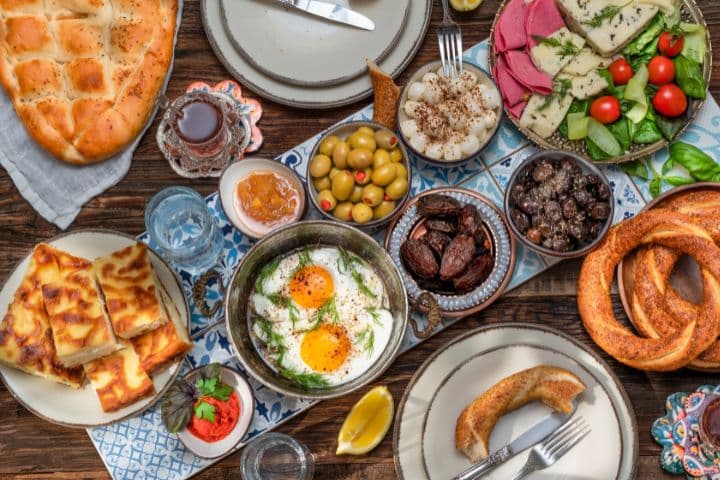For visitors to Dubai during the holy month of Ramadan, understanding local customs and traditions enriches the travel experience immensely. One of the most significant aspects of Ramadan is Suhoor, a pre-dawn meal that holds deep cultural and spiritual importance throughout the Islamic world. This guide explores what Suhoor is, its significance, the foods traditionally enjoyed, and how visitors can experience this special tradition in Dubai.
What is Suhoor? Understanding the Pre-Dawn Meal

Suhoor (also spelled Suhur or Sahur) is the pre-dawn meal consumed by Muslims before beginning their daily fast during Ramadan. Taken before the Fajr (dawn) prayer, this early morning meal provides the sustenance needed to endure the day’s fast until Iftar, the evening meal that breaks the fast at sunset.
The word “Suhoor” comes from the Arabic word “Sahar,” which refers to the time just before dawn. This meal is considered so important that the Prophet Muhammad strongly encouraged Muslims not to skip it, saying, “Take Suhoor, for there is blessing in Suhoor.”
The Significance of Suhoor During Ramadan
Suhoor serves multiple important purposes during the holy month:
Spiritual Preparation
Beyond its nutritional importance, Suhoor is a time for spiritual reflection and preparation for the day of fasting ahead. Many Muslims use this quiet pre-dawn period for prayer, Quran recitation, and contemplation.
Physical Sustenance
From a practical standpoint, Suhoor provides the energy and hydration needed to sustain the body through a day without food or drink. Nutritionists recommend that the meal include a balance of complex carbohydrates, proteins, and healthy fats to provide sustained energy.
Community and Family Bonding
In many households and communities, Suhoor becomes a special time for family members to gather. Though it occurs at an unusual hour, the shared experience of waking before dawn creates unique memories and strengthens family bonds. This spirit of connection also extends to family-friendly desert safaris organized during Ramadan in Dubai.
Cultural Tradition
The traditions surrounding Suhoor vary across different Muslim communities worldwide, but all share the common purpose of preparing for the day’s fast. These traditions have evolved over centuries, creating rich cultural practices unique to different regions.
Traditional Suhoor Foods in the UAE
The UAE has developed its own distinctive Suhoor traditions, blending Bedouin culinary heritage with influences from across the Arab world, India, and Persia. Here are some traditional foods commonly enjoyed during Suhoor in the Emirates:
Staple Dishes
- Harees: A porridge-like dish made from wheat and meat, slowly cooked until reaching a smooth, thick consistency. Its high protein and complex carbohydrate content make it ideal for Suhoor.
- Balaleet: Sweet vermicelli noodles flavored with saffron, cardamom, and rose water, often topped with an omelet. This sweet-savory combination provides a gentle energy boost.
- Chebab: Emirati pancakes made with fermented batter, saffron, and cardamom, usually served with date syrup or honey.
- Thareed: Pieces of flatbread soaked in a flavorful broth with meat and vegetables, providing a nourishing and hydrating start to the day.
Proteins and Dairy
- Labneh: Strained yogurt that delivers protein, probiotics, and calcium.
- Eggs: Prepared in various ways, from boiled to scrambled with vegetables.
- Foul Medames: A hearty dish of fava beans cooked with olive oil, lemon juice, and garlic.
Fruits and Vegetables
- Dates: Rich in natural sugars, fiber, and essential minerals, dates provide quick energy and are a traditional food to start the meal.
- Fresh and dried fruits: Particularly those high in water content like watermelon, or those with slow-release energy like bananas.
Beverages
- Water: Hydration is crucial before a day of fasting.
- Laban: A yogurt drink that aids digestion and provides protein.
- Karak Chai: A spiced milk tea popular throughout the UAE.
- Vimto: Though not traditional, this fruit cordial has become enormously popular during Ramadan in the Gulf region.
The Suhoor Experience in Dubai
For visitors to Dubai during Ramadan, experiencing Suhoor offers a unique cultural insight. Here’s how and where you can participate in this tradition:
Luxury Hotel Suhoor Tents
During Ramadan, many luxury hotels in Dubai transform their restaurants or set up special tents for Suhoor. These venues often remain open until the early hours of the morning, offering lavish buffets featuring both traditional Emirati dishes and international cuisines. Some notable options include:
- Asateer Tent at Atlantis, The Palm
- Al Fanous Lounge at Jumeirah Al Qasr
- The Majlis at Dubai Opera
Traditional Restaurants
Several restaurants across Dubai offer authentic Suhoor experiences, serving traditional Emirati and Arabic cuisine:
- Arabian Tea House in Al Fahidi Historical District
- Al Fanar Restaurant & Cafe
- Seven Sands at JBR
Desert Suhoor Experiences
For a truly memorable experience, consider joining a special Ramadan desert safari that includes Suhoor under the stars. During Ramadan, some desert safari companies, including Go Trips Dubai, offer modified schedules to accommodate fasting guests, with evening desert adventures culminating in Iftar at sunset and continuing through to Suhoor before returning to the city.
You can book an evening desert safari tour in Dubai with Go Trips Dubai, which includes traditional meals, cultural performances, and a serene setting that becomes even more special during Ramadan.
This unique experience allows visitors to connect with the spiritual atmosphere of Ramadan while enjoying the tranquility of the desert at night – a perfect setting for the reflection that accompanies this special meal.
Etiquette for Non-Muslims During Suhoor
Visitors to Dubai during Ramadan are welcome to participate in Suhoor experiences. Here are some etiquette tips to observe:
- Dress modestly: Whether in a hotel, restaurant, or the desert, modest attire is appropriate during Ramadan.
- Be respectful of the atmosphere: Suhoor has both social and spiritual dimensions. Some venues may be lively and festive, while others maintain a more reflective ambiance.
- Photography: Always ask permission before taking photographs, especially of people.
- Timing: Remember that Suhoor ends at dawn, so venues will close promptly to allow Muslims time for the Fajr prayer.
When is Suhoor Served?

The timing of Suhoor is directly tied to the Fajr prayer time, which changes slightly each day as dawn arrives earlier throughout Ramadan. Generally:
- Suhoor begins after the Isha (night) prayer, which is approximately 1.5-2 hours after sunset
- Many restaurants and hotels in Dubai serve Suhoor from around midnight until 3:00 or 4:00 AM
- The meal must end before the Fajr prayer begins (dawn)
- Many Muslims aim to finish eating about 10-15 minutes before the Fajr prayer time to ensure their fast is valid
Dubai’s Department of Tourism publishes Ramadan calendars annually with exact prayer times, which visitors can use to plan their Suhoor experiences.
Differences Between Iftar and Suhoor
Many Iftars take place as dinner in the Dubai desert, combining food with cultural performances. Visitors to Dubai during Ramadan often hear about both Iftar and Suhoor. Here are the key differences:
| Aspect | Iftar | Suhoor |
| Timing | Sunset (Maghrib prayer) | Pre-dawn (before Fajr prayer) |
| Purpose | Breaking the day’s fast | Preparing for the upcoming day’s fast |
| Traditional first food | Dates and water | Often starts with dairy or wholesome foods |
| Atmosphere | Celebratory, festive | Quieter, more reflective |
| Duration | Longer, often extending into evening | Briefer, with focus on nutrition |
| Social nature | Often large gatherings | Typically more intimate, family-oriented |
Experience the Magic of Ramadan in Dubai
Suhoor represents just one facet of the rich tapestry of Ramadan traditions that visitors can experience in Dubai. The holy month transforms the city, creating a unique atmosphere of spiritual reflection, community, and cultural celebration that is fascinating to witness.
For visitors seeking to immerse themselves in authentic cultural experiences, participating in a traditional Suhoor – whether in the city or under the stars in a traditional Bedouin setting. During Ramadan, Go Trips Dubai offers specially adapted desert experiences that respect the observance of fasting while providing unique opportunities to enjoy both Iftar and Suhoor in the tranquil desert environment. These experiences allow visitors to connect with local traditions in an authentic setting while enjoying the natural beauty of the Arabian desert.
Interested in experiencing the magic of Ramadan in Dubai, including authentic Suhoor in the desert? Contact Go Trips Dubai to inquire about our special Ramadan desert safari packages.





